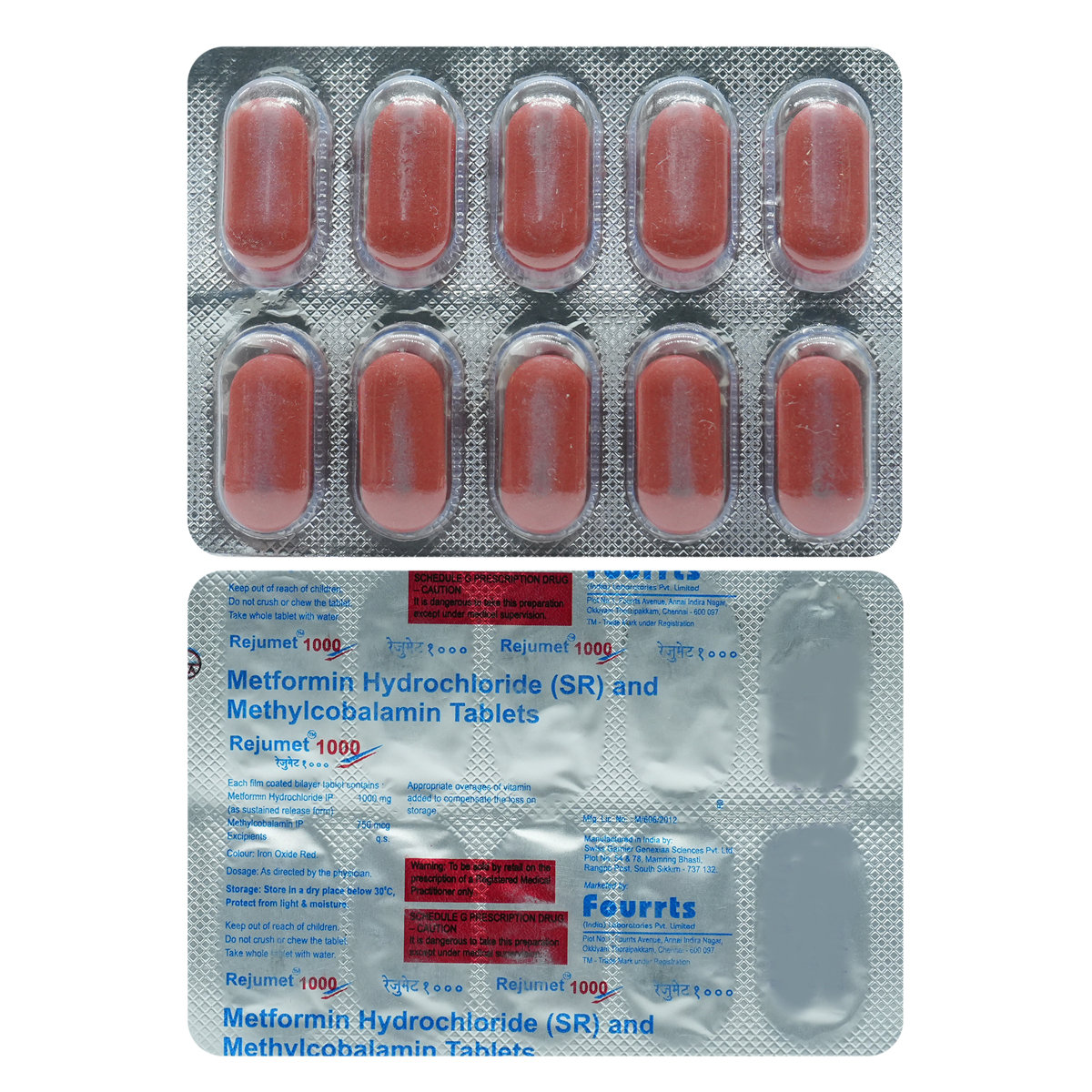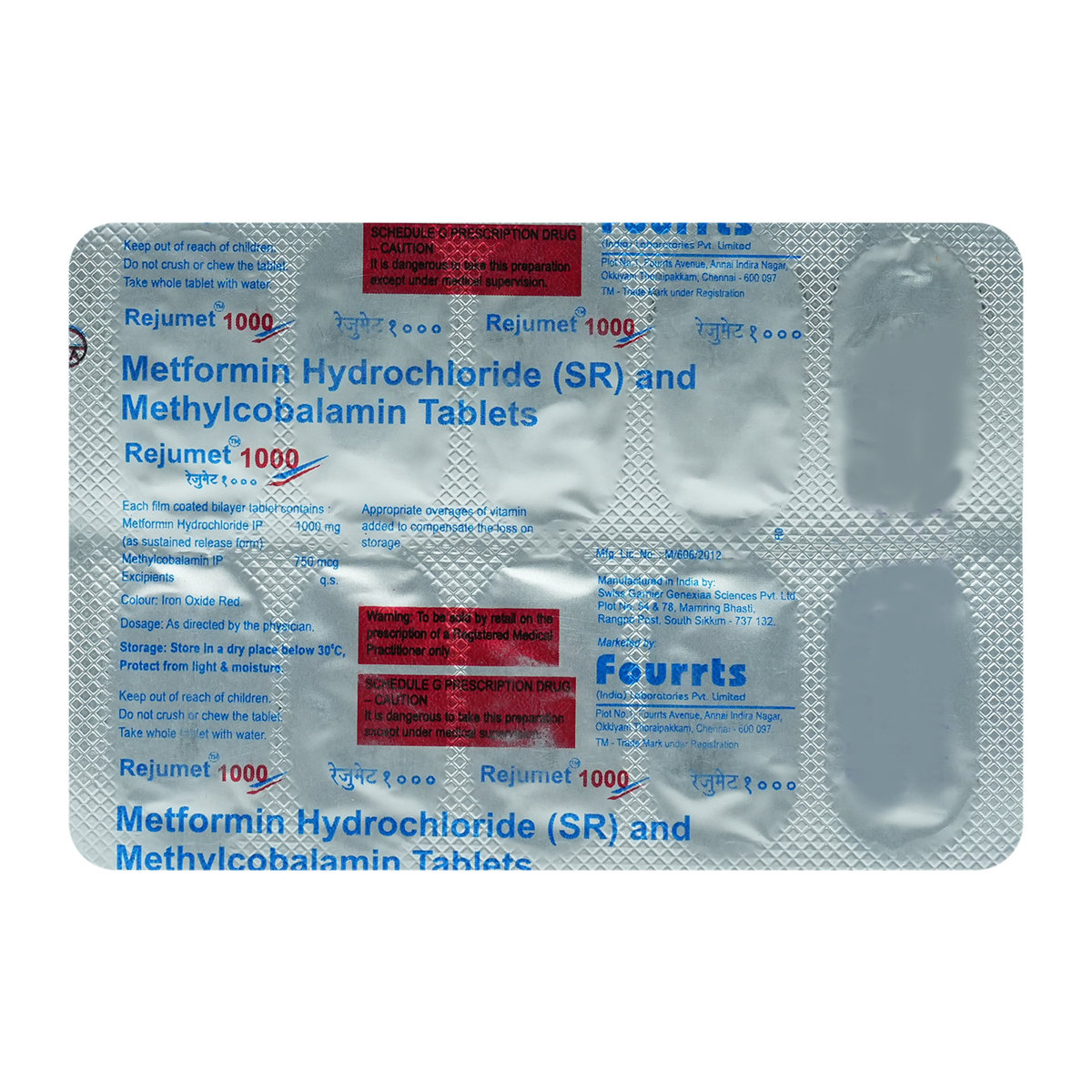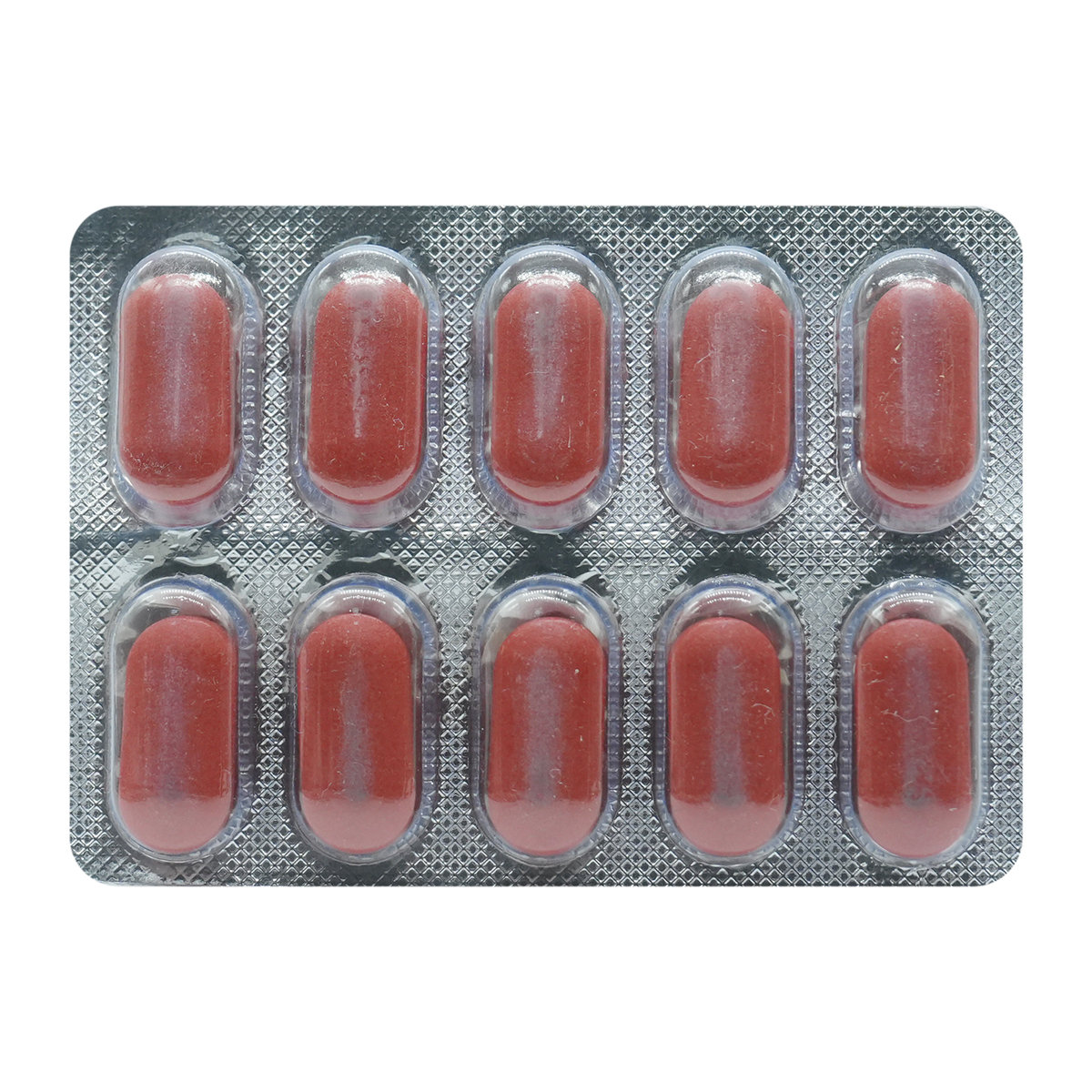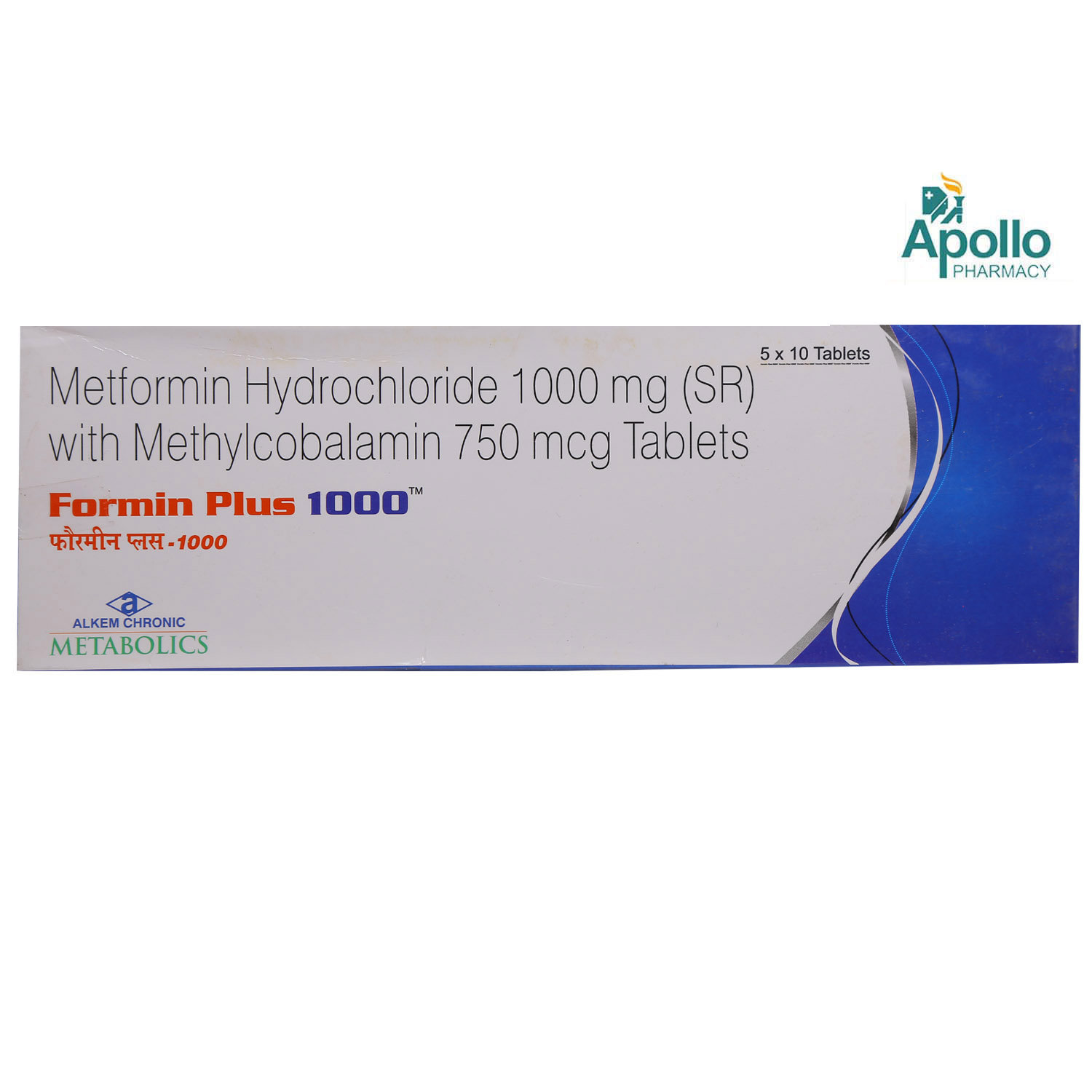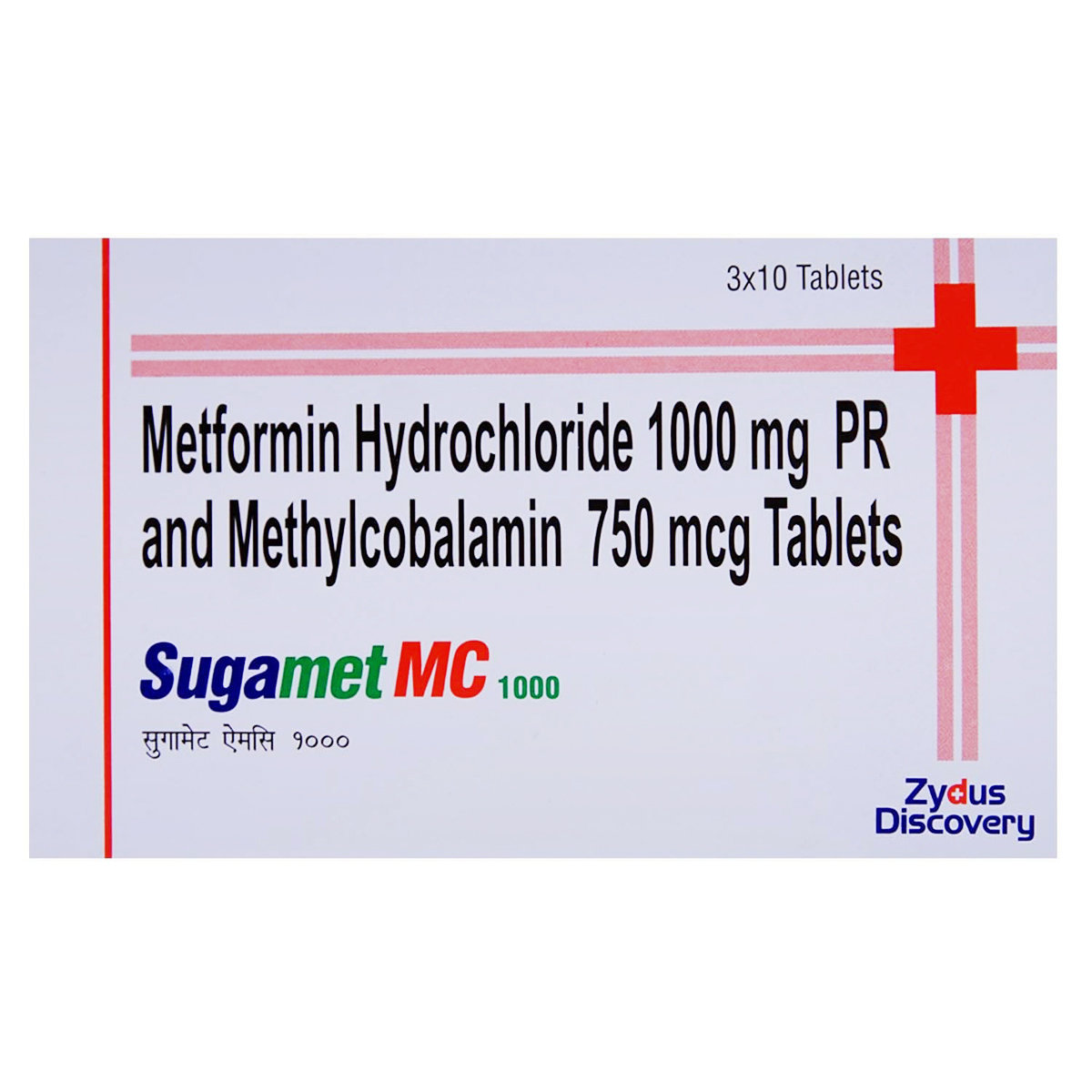REJUMET 1000MG TABLET
MRP ₹73
(Inclusive of all Taxes)
₹10.9 Cashback (15%)
Provide Delivery Location
Online payment accepted
 Prescription drug
Prescription drugWhats That
Composition :
Manufacturer/Marketer :
Consume Type :
Expires on or after :
Return Policy :
About REJUMET 1000MG TABLET
REJUMET 1000MG TABLET belongs to the group of medications called ‘anti-diabetic’ used in the treatment of Type 2 diabetes mellitus. Type 2 diabetes mellitus is a chronic or life-long condition in which blood sugar or glucose levels rise more than normal. It occurs when the body does not produce enough insulin (metabolizes glucose), or if produced, it cannot function properly in the body.
REJUMET 1000MG TABLET is a combination of two medicines, namely: Metformin and Methylcobalamin. Metformin acts by decreasing liver glucose production and intestinal glucose uptake. It may deplete vitamin B12 levels. So, it is taken with methylcobalamin that can treat vitamin B12 deficiency. Thus, REJUMET 1000MG TABLET does not cause a sudden lowering of the blood glucose level or significant hypoglycemia.
You should take this medicine as prescribed by your doctor. You may experience side-effects of such as changes in taste, nausea (feeling sick), vomiting (falling sick), diarrhoea, headache, anorexia (loss of appetite), and sweating. Inform your doctor if any of these side-effects persist or worsen.
Do not take REJUMET 1000MG TABLET if you are allergic to any of its contents. Before taking REJUMET 1000MG TABLET, inform your doctor if you have liver problems, severe kidney failure, uncontrolled diabetes, dehydration due to severe diarrhoea or vomiting, severe infections, acute heart failure or heart attack, and alcoholism. Also, inform your doctor if you are pregnant, planning to become pregnant, or breastfeeding.
Uses of REJUMET 1000MG TABLET
Directions for Use
Key Benefits
REJUMET 1000MG TABLET is a combination of two medicines, namely: Metformin and Methylcobalamin. Metformin acts by decreasing liver glucose production and intestinal glucose uptake. Methylcobalamin reduces vitamin B12 deficiency. REJUMET 1000MG TABLET does not cause significant hypoglycemia (sudden lowering of the blood glucose level). It is usually preferred in obese patients with diabetes as it may cause weight loss and lowers the complications of diabetes.
Storage
Drug Warnings
REJUMET 1000MG TABLET may cause a rare and serious side-effect ‘lactic acidosis’ (buildup of lactic acid in the blood), characterized by abdominal pain, muscle cramps, vomiting, severe fatigue, and difficulty breathing. It is a life-threatening condition that requires immediate medical attention. Inform your doctor if you have any severe liver or kidney problems as their normal functioning is required to eliminate excess lactic acid from the body. Do not consume excess alcohol as it increases the risk of lactic acidosis. It should be used with caution in patients with heart diseases as it increases the risk of heart failure. If you have dehydration (severe loss of body fluids) due to severe vomiting, diarrhoea, exposure to heat, or fever, stop taking REJUMET 1000MG TABLET and immediately seek medical attention. REJUMET 1000MG TABLET may cause electrolyte imbalance, so taking this medicine during dehydration can worsen the condition.
Diet & Lifestyle Advise
- Fill your half plate with starchy veggies, a quarter with proteins, and a quarter with whole grain.
- Eat at regular intervals. Do not take the long gap between a meal or snack.
- Monitor your blood sugar level regularly, especially when there are a lot of fluctuations.
- Invest at least 150 min of moderate-intensity physical activity and 15 minutes of high-intensity exercise every week.
- Lose weight gradually to achieve a healthy body mass index (18.5 to 24.9).
- Replace refined carbohydrates containing whole-grain foods and increase intake of fruits and veggies and other fibre-enriched foods.
- Reduce intake of saturated fat (or hidden fats) in food like chips, crisps, pastries, biscuits, and samosas. Choose omega 3 fatty acid-containing oils for daily cooking. You may use palm oil, mustard oil, groundnut oil, rice bran oil, and safflower oil for frying.
- Do not take stress as it may elevate your blood sugar level. You may adopt stress management techniques like mindfulness, yoga, or meditation to control stress-related blood sugar changes.
- Opt for low-fat dairy products (low-fat yoghurt, fat-free milk, and cheese, etc.).
- Keep your blood pressure as normal (120/80) as possible as it reduces the risk of cardiovascular diseases in diabetes patients.
Side Effects of REJUMET 1000MG TABLET
- Change in taste
- Nausea (feeling sick)
- Vomiting (being sick)
- Diarrhoea
- Hot sensation
- Headache
- Anorexia (loss of appetite)
- Sweating
Habit Forming
Therapeutic Class
All Substitutes & Brand Comparisons
RX
Formin Plus 1000 Tablet 10's
Alkem Laboratories Ltd
₹118.5
(₹10.67 per unit)
62% COSTLIERRX
Sugamet MC 1000 Tablet 10's
Zydus Healthcare Ltd
₹175
(₹15.75 per unit)
139% COSTLIER
FAQs
Drug-Drug Interactions Checker List
- IBUPROFEN
- CELECOXIB
- CIMETIDINE
- OMEPRAZOLE
- SALBUTAMOL
- DOLUTEGRAVIR
- TOPIRAMATE
- LAMOTRIGINE
- NEOMYCIN
- VERAPAMIL
- RIFAMPICIN
- TRIMETHOPRIM
- RANOLAZINE
- VANDETANIB
- ISAVUCONAZOLE
Special Advise
Beware of hypoglycemia (low blood sugar level) symptoms include sweating, dizziness, palpitations, shivering, intense thirst, dry mouth, dry skin, frequent urination, etc. Whenever you experience these symptoms, try to eat 5-6 candies or 3 glucose biscuits or 3 teaspoons of honey/sugar and get in touch with your doctor. Make sure you carry these with you at all times, especially for long travels.
Disease/Condition Glossary
Type 2 Diabetes Mellitus: It is a chronic or lifelong disease that keeps the body away from properly utilizing insulin. Hence, people affected with type 2 diabetes either do not produce enough insulin, or there is resistance to the action of insulin. Middle-aged or older are most likely to suffer from type 2 diabetes, so it is also known as adult-onset diabetes. Symptoms of type 2 diabetes include increased thirst, frequent urination at night, slow wound healing, increased hunger, fatigue, and blurred vision. In some cases, there may be weight gain while in rare cases weight loss may be observed. The complication of type 2 diabetes also includes neuropathy (nerve problems), nephropathy (kidney problems), and retinopathy (damaged retina of eyes or blindness), loss of limbs, sexual dysfunction, and increase the chance of heart attack or stroke.

Have a query?
Alcohol
Safe if prescribed
Alcohol may increase the risk of side-effects and worsen the condition.
Pregnancy
Consult your doctor
REJUMET 1000MG TABLET is a category B drug. It should be used in pregnant women only if clinically needed.
Breast Feeding
Consult your doctor
REJUMET 1000MG TABLET should not be used in breastfeeding mothers as it may get secreted in the breast milk and cause unwanted effects in the nursing babies.
Driving
Safe if prescribed
REJUMET 1000MG TABLET does not affect your ability to drive.
Liver
Consult your doctor
REJUMET 1000MG TABLET should be taken with caution especially if you have a history of liver diseases. The dose may have to be adjusted by your doctor.
Kidney
Consult your doctor
REJUMET 1000MG TABLET should be taken with caution in patients with kidney diseases. The dose may have to be adjusted by your doctor.
Children
Safe if prescribed
REJUMET 1000MG TABLET can be used in children above 10 years of age if clinically required.
Recommended for a 30-day course: 3 Strips

